
Volume 62 No. 3 May/June 2024

TOGETHER WITH THE WORLD
P. 6
INTENTIONAL ACTS OF COMPASSION
P. 10
PREDESTINATION IS A CHALLENGING TOPIC FOR CHRISTIANS P. 14
TESTIMONY: THE PRODIGAL RETURNS
P. 16


Volume 62 No. 3 May/June 2024

TOGETHER WITH THE WORLD
P. 6
INTENTIONAL ACTS OF COMPASSION
P. 10
PREDESTINATION IS A CHALLENGING TOPIC FOR CHRISTIANS P. 14
TESTIMONY: THE PRODIGAL RETURNS
P. 16
A FEW YEARS ago, after an Abundant Springs* weekend, we heard back from Briercrest about how respectful and well-mannered EMC students were compared to some of their other groups. Naturally, we congratulated ourselves because that spoke so well of the students, families and ministry leaders in EMC churches.
But then somebody ruined the moment by pointing out that maybe the more unruly groups were that way because their youth groups included more students coming from outside the church family and had experienced a lot of brokenness. If that was the more accurate way to interpret the comment, then being a “wellbehaved group,” though still reflecting well on EMC students and their families, was less of an achievement in terms of how well we were being the church.
You can do with that what you will, but the point is that if we’re drawing people from outside our church family, then our churches may well be less predictable. If we’re actively caring for and discipling people from our own church body who are dealing with troubling circumstances rather than letting them pull away unnoticed, we will look less put together. Just as importantly (because it turns out, the unruliest groups at Abundant Springs were super-churched kids, not un-churched kids) if we coach rather than dismiss people who act arrogant and superior, we could open ourselves to more critique.
The good news is that we’re already less put together than we might think!
The great news is that God is at work right where we are!
*Biennial EMC youth event held at Briercrest College in Caronport, Sask.
In this issue you will find a range of topics, from a theological conundrum that is creating intense discussions in some EMC churches (Zwaagstra) to articles about passing on the faith and two about God’s transforming power.
On that last one: It wasn’t our intention as editors to put Gord Utz and Kyla Gillespie’s stories in the same issue of The Messenger to make a point—they were just great stories of God at work transforming people into his image. But their stories share a surprising number of parallels including the fact that both were raised in Christian families and enjoyed hockey. They both found themselves not fitting the world they were born into and not fitting the alternative either— both were alienated from God, and both returned to him in large part through the ministry of pastor friends. Like I said, great stories!
But they are also very different. The story of Gord, told by Phil Callaway, talks about issues most of us have seen, often in our own families. And the familiarity means we can hear it quite easily and celebrate God’s work in his life.
The story Kyla tells on the other hand, is not one most of us have experienced personally and her struggle is with things that are in the realm of “issues;” frequently in the news and often politicized. That means her story might spark other parts of our brain when reading it. If it does, it’s okay to give ourselves space to work that through and then read it again and see, instead of an issue, a person God loves deeply and has invested in.
May God’s grace go with us all as we move into summer with its unique opportunities and challenges.
– Erica Fehr, Managing Editor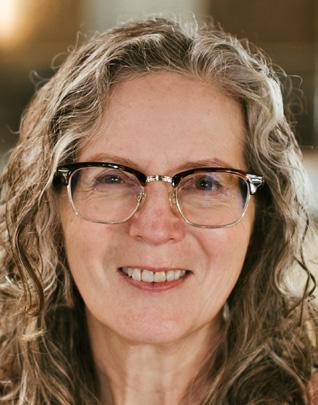
with the world
By Andrew DyckThe world is opposed to the kingdom of God, but God still looks on the world with love.
Intentional acts of compassion
By Mo FriesenThe church can’t disengage around questions about gender and identity.
Predestination is a challenging topic for Christians
By Michael ZwaagstraWhile Christians may disagree on predestination, there is more that unites than divides us.
Testimony: The prodigal returns
By Phil CallawayPhil tells the compelling story of Gord Utz’s journey back to Jesus.
His light to my path The path to joy leads us through adversity
By Karla HeinFurther in and higher up
The church has no “leadership” crisis By Layton Friesen
Inviting faith
Why we need young men in children’s ministry
By Ruth Konrad
Editorial Letters and Notices With Our Missionaries With Our Churches News In Memory Shoulder Tapping
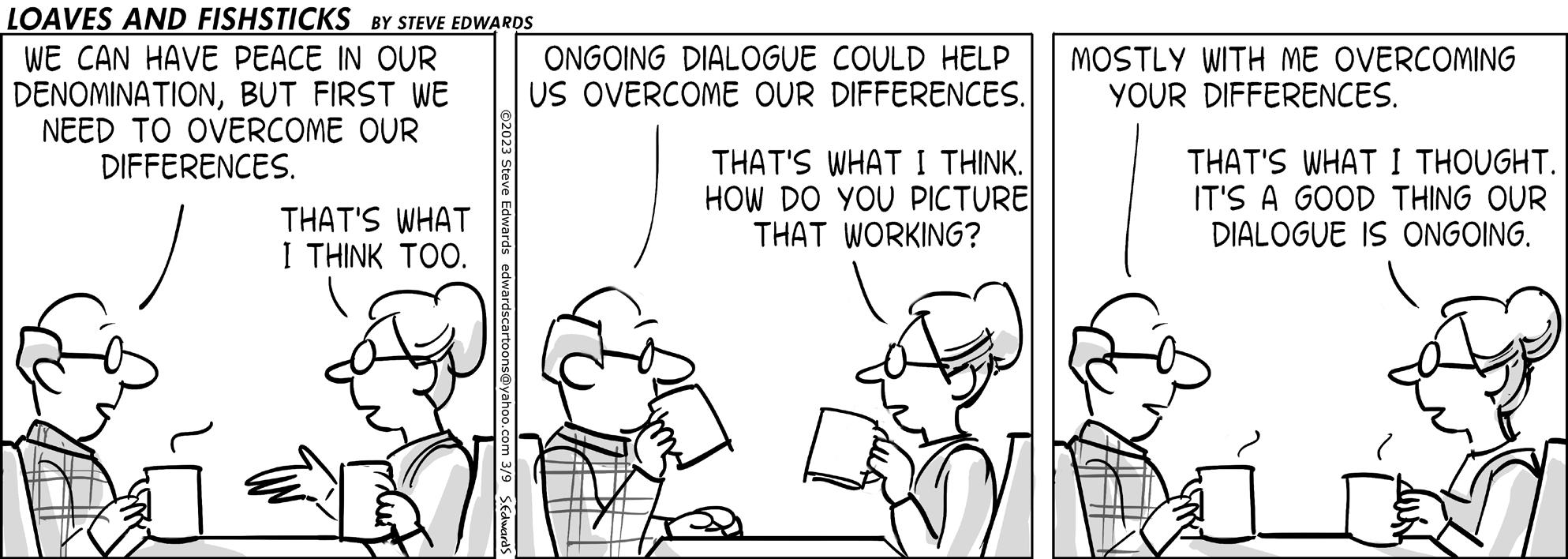
Volume 62 No. 3 May/June 2024
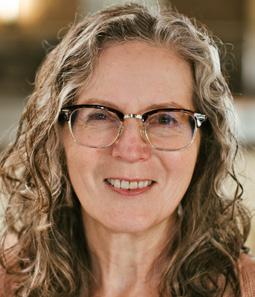
MANAGING EDITOR
ERICA FEHR
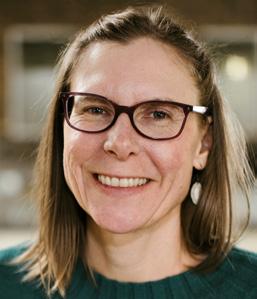
EDITOR REBECCA ROMAN
PUBLICATION AND PURPOSE
The Messenger is the publication of the Evangelical Mennonite Conference, 440 Main Street, Steinbach, MB R5G 1Z5. Its purpose is to inform concerning events and activities in the denomination, instruct in godliness and victorious living, inspire to earnestly contend for the faith.
Phone: 204-326-6401 messenger@emconference.ca www.emcmessenger.ca
ISSN: 0701-3299
Publications Mail Agreement Number: 40017362
Second-class postage paid at Steinbach, MB
COPYRIGHT
The articles printed in The Messenger are owned by The Messenger or by the author and may not be reprinted without permission. Unless noted, Scripture quotations taken from The Holy Bible, New International Version® NIV®, Copyright © 1973, 1978, 1984, 2011 by Biblica, Inc.TM Used by permission. All rights reserved worldwide.
SUBMISSIONS
Views and opinions of writers are their own and do not necessarily represent the position of the Conference or the editors. Advertising and inserts should not be considered to carry editorial endorsement.
Letters, articles, photos and poems are welcome. Submissions should be sent to messenger@emconference.ca
CHANGE OF ADDRESS AND SUBSCRIPTIONS
Print subscriptions are free of charge to all members and adherents of EMC churches in Canada. For those not associated with an EMC church we suggest a donation of $20.00/year.. To sign up for the email newsletter or submit an address change, email messenger@emconference.ca
ADVERTISING
The Messenger does not sell advertising, but provides free space (classified and display) to enhance our Conference, its churches, boards and ministries; inter-Mennonite agencies and educational institutions; and the wider church. Ads and inquiries can be sent to messenger@emconference.ca
Evangelical Mennonite
evangelical mennonite conference
We give thanks to God for the continued strong support of EMC ministries, and we acknowledge the contributions of EMC churches and individuals who give so generously.
– The Board of Trustees
*Income includes donations and transfers from other funds (e.g., estate funds).
The ancient global treasure of EMC faith [Jan/Feb 2024 issue] need to address very sensitively and with much compassion, since many people in our neighbourhoods, families, and churches are dealing with those realities personally.
When I opened my copy of the Jan/ Feb issue of The Messenger I was looking forward to reading Layton Friesen’s commentary on the treasure we have in our Anabaptist faith tradition. Since I identify strongly with this historical stream of the church which emphasizes “following Jesus daily in life,” I was pleased to see this described as a “treasure.” Because “evangelicalism” is a much more recent term to describe details of faith, and currently comes with some baggage, I prefer to describe myself as simply Anabaptist—in my mind this term includes many of the tenets we appreciate in evangelicalism. But I was taken aback by Layton’s analysis and description of Anabaptist at both ends of the theological spectrum, whether conservative or liberal. To talk of Anabaptism by itself to be “unstable and deficient” ending up “in dead ends of moralistic legalism” or “secular left-wing ideology” is a comment that causes me pain and indicts people and institutions that I regard deeply. Also, the secular trends listed are ones that we as Christ’s followers
Having seen the global Anabaptist church in the context of Mennonite World Conference, both those on the conservative end and the more progressive expression, I was gratified that the closing section of the article described some of our faith tradition in a very positive tone, mentioning terms like the forgiveness of sins, Christian ethics, and the anointing of the Spirit, lived out in the context of the church. I liked that description of the Anabaptist church a lot.
Together in the Kingdom, – Ron Penner Winnipeg, Man.
Letters (250 words or less) are generally to comment on issues raised in The Messenger. The magazine reserves the right to edit letters.
I was so pleased to read Peter Ascough’s article (Mar/Apr 2024) explaining a spiritual practice that has become so important to me. My journey with spiritual direction has been a wonderful one of deepening personal encounter with God. (Especially as my family and I transitioned to Canada in 2017 after 11 years serving with MAF in Madagascar, where we were supported financially by many individual EMCers and our sending churches.) Since our arrival I have trained as a spiritual director and currently offer direction through my private practice based in Winnipeg (FerventFolk.com),
Receiving spiritual direction, as well as offering direction to others after my training, has fed the thirst for “more” that I struggled with coming back into the busy and fractured culture of

From the web www.emcmessenger.ca
“Carseats, gluten and opinionated bloggers” p. 14, Mar/Apr 2024 issue
Canada. It seems to me there is something especially challenging about life as a Christ follower in our culture— there are simply too many things vying for our attention! It’s so easy—the default, in fact—for me to miss the movement of the Spirit in my life because I’m not living as slow (or uncomfortable?) as I was when I lived in Madagascar or Lithuania.
A spiritual director knows how to listen both to me and the Spirit’s whispers within my words and experiences, knows how to ask good questions and has the strength to refrain from offering easy answers. I would add my voice to Peter’s in recommending this “new ancient practice” for anyone seeking a deeper, more attentive spiritual practice.
Jocelyn R. Plett Winnipeg, Man.
My child has a $500 carseat. It was given to us as a gift (but that “you love your child more than I do” zinger was, well, zingy).
It does feel like there’s a lot of legalism to choose between in parenting. It does take a lot of faith and humility. And I’m discovering it also takes grace for other parents who are, intentionally or unintentionally, choosing different systems.
– Jessica Plett
The staff housing at Radio Mensajero was originally constructed with poor-quality materials and needs to be replaced. They own four homes made available to full-time radio staff and this project is to replace one of them as it is no longer in repairable condition.
Goal: $19,000

The Fraternity of churches in Nicaragua—a church conference that is the result of EMC mission work that ended in the 90s—is thriving and growing, maintaining its goal of starting one new outreach every year. Nutrition project funds are sent quarterly (when funds are available) to help churches provide a meal three times a week for undernourished children.
Goal: $4,400

tInstead of power to conquer and dominate, Christ spoke and modelled power to submit and serve.
ONE OF MY favourite TV shows when I was growing up was Pinky and the Brain
The premise of the show was ridiculous, simple, and brilliant. It followed two genetically altered mice; one was a genius (the Brain), and the other was a complete buffoon (Pinky). This odd couple broke free from their cage in Acme Labs every night with a singular goal: Try to take over the world! If you have never seen the show and want to be highly entertained for one minute, look up their theme song on YouTube. You won’t be disappointed.
World domination was not just all the rage in 1990s cartoons; it was quite the hot topic during the life and ministry of Christ as well. You could even say the Roman empire had perfected the art of conquest. They controlled
the vast majority of the known and civilized world, and no nation or group posed any serious threat to their authority. Rome clung to power through military might, rigid bureaucracy, and good old-fashioned fear. But Jesus was subversive; he taught differently on what true power looked like. Instead of power to conquer and dominate, Christ spoke and modelled power to submit and serve. In the book of Revelation, we see that the conquering Lion is indeed the Lamb that was slain. Jesus transformed what it looked like to change the world.
As followers of Christ, the cross redefines—not only what true power looks like—but how we relate to the world around us as well. Instead of factions warring for supremacy, we are
to live together with the world. The gospel of John in particular captures a flow of thought from the teaching of Jesus as to how we are to live out this togetherness.
When John uses the term “world” in his gospel, it is usually in the negative sense. He contrasts the kingdom of God to the kingdom of the world. The kingdom of God is supernatural, perfect, and composed of the people of God. The world, on the other hand, is natural, flawed, and composed of those not of God.
It would be simple and easy to read this contrast in John and assume that God’s attitude toward the world would be one of righteous anger and condemnation. For this exact reason, we must be reminded of one of the most wellknown verses in the Bible, John 3:16: “For God so loved the world that he gave his one and only Son, that whoever believes in him shall not perish but have eternal life.”
This is a verse that many of us memorize early in life in Sunday school. You can also catch a glimpse of fans holding up this sign behind home plate during a World Series game. It is a vital message for everyone to understand properly. The world may be opposed to the kingdom of God, but God looks upon the world with love in return.
If you are like me, you may find it easy to misread this verse we know so well. If I am not careful, I read it individually: “For God so loved [Andrew] …” If I am feeling more charitable, I will think of the people of God: “For God so loved [the church] …” It makes perfect human sense that God would love those who obey, so perhaps I will paraphrase: “For God so loved [the righteous] …” But none of those
tJesus declares that “God so loved the world.” Yes, the same world that is often in opposition to God.
ways of reading John 3:16 are correct. Jesus declares that “God so loved the world.” Yes, the same world that is often in opposition to God. The broken, the marginalized, the proud, the self-sufficient, the hypocrites, the liars, the openly hostile to God—God so loved them all.
This point is driven home as we continue to read verse 17: “For God did not send his Son into the world to condemn the world, but to save the world through him.” God looks upon the world with compassion, not condemnation. As his people, we must do the same. Whenever we talk about our relationship with the world and those around us, we must begin on the foundation that Jesus sees every single person as someone worth dying for. Love, not condemnation.
Even though as disciples of Jesus we are called to love and not condemn the world (following the example of Christ), that does not mean we are to participate fully in the world. The opposition remains, and the things of the world are often in conflict with the things of God. Once we have been saved by Christ, we must live differently. In his commentary on John, D. A. Carson says, “Christians are not to love the world with the selfish love of participation; God loves the world with the self-less, costly love of redemption.” It is a love that does not allow others to continue to live in ways harmful and detrimental to their relationship with God.
One implication for all believers in Christ is that this world (and all it has to offer) is not our home. In John 17:14, Jesus speaks about his disciples and points out that they do not belong
in the world. “I have given [my disciples] your word and the world has hated them, for they are not of the world any more than I am of the world.”
When you choose to follow Jesus, you become a citizen of the kingdom of God, and you no longer belong to the world. Citizenship portrays where your home is, but it also declares where your allegiance lies. I spent six years as a Canadian living in Texas, and it was a great experience. While I enjoyed living there, I also knew it wasn’t where I truly belonged. At school we were required to stand up and recite the pledge of allegiance to the U.S. flag every morning, and I didn’t know how to respond properly to this. Should I stand, or stay seated? Say the pledge, or stay silent? In the end, I decided to stand out of respect for my classmates, but stay silent during the recitation. My reason was simple; my allegiance was never to the U.S. flag.
Taking this a step further, our allegiance isn’t to any flag or earthly country. We belong to Jesus, and he has made us citizens of heaven. That is where our true allegiance lies, and it will take us out of the world as a result.
However, we need to seek balance. Does our allegiance in Christ allow us to escape the world? Absolutely not! While we are called to leave behind our participation in worldly things, we are not given the option of pulling away completely. Jesus continues his prayer in John 17:15–18 and shows us a different way. “My prayer is not that you take [my disciples] out of the world but that you protect them from the evil one. They are not of the world, even as I am not of it. Sanctify them by the truth; your word is truth. As you sent me into the world, I have sent them into the world.”
There is no mistaking the call on the lives of those who follow Jesus. We are called out of the world so that we can be sent back into the world. Just as Jesus stepped down from glory for a specific mission and purpose, his people are missionaries to a world they no longer truly belong to. This means we do not have the luxury of removing ourselves from every non-Christian situation or person. No “holy huddles” allowed! It means we must be intentional about how we live out our lives, interact with those around us, and follow Jesus.
If we are looking for ways to be more intentional about sharing the truth of Jesus as those sent into the world, the most effective method is also given to us in John 17. Let us continue from verse 20, following the flow of thought in Jesus’ prayer. “My prayer is not for them alone. I pray also for those
tThere is no mistaking the call on the lives of those who follow Jesus. We are called out of the world so that we can be sent back into the world.

who will believe in me through their message, that all of them may be one, Father, just as you are in me and I am in you. May they also be in us so that the world may believe that you have sent me.”
This is the culmination of what we learned together at the EMC Young Adult Retreat. We are together with God (be “in” the Father, Son and Spirit), who brings us together with one another (may all be one), so that the world will know that the Father sent the Son to save them and not condemn them. We do not receive our relationship with God or unity as a church to keep it to ourselves. We receive these things for the benefit of the world around us, so that they also may believe in Jesus. Our relationship with God and others is not just beneficial, it is missional.

Of course, how we live this out is of the utmost importance. Jesus clearly teaches here that our unity as believers speaks volumes to the watching world. Looking to D. A. Carson once more, he says, “As the display of genuine love amongst the believers attest that they are Jesus’ disciples, so this display of unity is so compelling, so un-worldly, that their witness as to who Jesus is becomes explainable only if Jesus truly is the revealer whom the Father has sent.”
We are called to love one another in an un-worldly way. But does our love for each other stand out to the world? Far too often, it does not. Just as our love for one another has the power to bring people closer to Jesus, our lack of togetherness is powerful to push people away.
So how will you act next time conflict arises in the church? What type of posture will you take when others around the table disagree with you in a committee meeting?
How will you respond when a piece of juicy gossip hits your ears? What if the style of music and preaching isn’t to your personal taste? In each of these instances (and so many more), we need to be committed to lovingly protecting the togetherness of the church. Because the world is watching, and it needs to see Jesus.
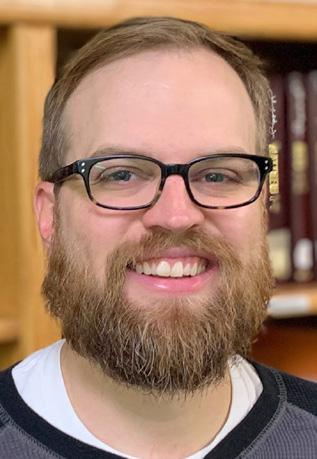
Andrew Dyck (BA, MDiv) is senior pastor of Stony Brook Fellowship in Steinbach, Man. This article is based on one of the presentations given at the Young Adult Retreat held March 1–3, 2024.
Why the seminar with Kyla Gillespie was valuable for EMC youth leaders
IN THE PAST few months, over 90 EMC youth leaders attended one of the Youth Worker Community (YWC) Conferences (sixty-plus in Winnipeg and thirty-plus in Calgary). There were many great workshops on a variety of themes which gave attendees a lot to think about and process: helping students discover and grow spiritual discipline, how to lead teenagers to Christ, managing small groups and making the most of events and experiences, among others.
One of the main sessions at both conferences was an interview with Kyla Gillespie led
By Mo Friesenby YWC Director Sid Koop. Sid began the session by explaining that YWC was committed to a biblically orthodox theology of marriage and sexuality, where sexual intimacy is between a male and a female in the context of a marriage commitment. They also believe that gender is by nature binary and that humans are created male and female. This statement aligns with the EMC Statement of Faith and Church Practices.
Over the course of the session, Kyla was able to share her faith story and to introduce us, as leaders, to the ways that her pastors were able to help her experience the transforming work of Jesus.

And then gender dysphoria is this internal incongruent struggle, and it can be different for all trans people in different levels, different degrees. Mine ended up in my late 20s being so debilitating that I could barely even function.”
– Kyla Gillespie (all quotes from Volunteer Youth Worker Podcast episode 200)
YLA’S STORY INCLUDES growing up in family that was involved in their local church and loved Jesus. She explained that, while growing up, she never felt completely comfortable doing the activities that most girls her age participated in. She loved hockey and she ended up being scouted by the Canadian National Women’s team and training with them.
During this time, she began to learn what she described as new language to describe her feelings surrounding gender and same-sex attraction. As she continued to be part of this new community she grew in her desire to begin the transition to become male. While she still believed in God, it felt necessary to park her faith because of the choices she was making.
“ It wasn’t like, oh, I’m going to tell you all the hard truth right away, and you have to detransition. It’s like, no, let’s meet where you’re at.”
While Kyla was living as male, a new pastor couple began leading the church that she had been connected to. She was drawn to them for two reasons. First of all, they were leading the church to authentically follow Scripture. Secondly, they demonstrated that they loved God and others more than they loved themselves. They did this through intentional acts of compassion as she would experience in the years to come.
Because they only knew Kyla as a man, when she finally revealed her story to them, their reaction shocked her. They continued to love and respect her. They continued to interact with her and to use the male name she had chosen when she transitioned. Through an ongoing, authentic relationship with the church family and a decision to surrender all parts of her life to the headship of Jesus, Kyla came to the decision that she was being called by God to detransition back to her birth sex. She knew this would be a difficult process physically, emotionally, and socially, but the pastors stayed committed to her and invited her to stay in their home during the transition process.
Kyla described a point when she met with the pastors, and they chose to enter a relationship of mutual grace. The pastors asked her to show them
grace as they tried to help her understand the truth of Scripture. They recognized there would be times when they would say things that were difficult for her to hear and potentially say things in a way that might offend her. She responded by asking for grace, knowing that she would push back against what they would say because it meant changing how she defined herself. Both parties agreed and they were able to navigate the process together. The pastors never changed their commitment to following Scripture but chose to navigate the relationship with love and grace.
AS I HAVE travelled around our conference in the last year, the topic of gender identity and same-sex attraction has been identified as a significant issue within many of our EMC churches. I have heard from lead pastors and youth leaders that there is a desire to teach a historically and biblically orthodox theology of marriage and sexuality, while wrestling with how to be a church that welcomes all people to experience the transformational work of Jesus. As I listened to Kyla’s presentation, there were a couple of key points that our youth leaders (and churches) need to hear.
1. This is a complicated conversation that involves people and not just issues. At times within the church framework, we want to create responses to issues that will clearly help us to maintain the holiness of our community. We create response papers to issues, but, like many cultural situations, we need to acknowledge that there are real people that are living in the reality of this discussion.
While we hold to a historically and biblically orthodox view of marriage and sexuality, we also hold to the understanding that God’s love is for everyone (John 3:16), salvation is available to all who call on his name (Joel 2:22) and that we all have sinned and fall short of the glory of God (Romans 3:23). Each one of us is invited to “deny [our]selves and take up [our] cross daily and follow [Jesus]” (Luke 9:23).
Discipleship involves walking alongside those who desire to become more like Jesus; often, that can mean stepping into challenging conversations and interactions. Jesus didn’t shy away from those difficult conversations. When Jesus met Zacchaeus, Jesus saw him in the crowd and chose to eat with him at his house. It was through that relationship that Zacchaeus experienced transformation in his life. Jesus offered compassion but didn’t stray from truth. As we walk into discussions of gender and sexuality, we need to remember that we can hold to a biblical view of marriage and sexuality, but we also need to build relationships that allow our friends to meet, interact with and grow in their love for Jesus.
2. We don’t need to be perfect in our response, but we do need to be consistent. If our goal is to invite people into relationship with Jesus, then we need to start with relationship. I am not able to introduce people to the Saviour that changed my life if I start with condemnation. It will be even more difficult to introduce people to Jesus if I choose to only condemn certain actions and ignore others.
Gillespie’s story of sitting with her pastor couple and giving each other mutual grace is a beautiful picture of what ministry with people we don’t agree with can look like. There will be times where leaders will say things in a way that is less than sensitive, there will also be times that we will disagree with each other’s responses. If there has been relationship built that demonstrates integrity and care, then those disagreements can be worked through in relationship. The goal is to lead others to encounter Jesus and encourage them to surrender all aspects of their lives to their Saviour.
3. This is a growing conversation that all our students are navigating at some level. If we hide our heads in the sand and pretend like our students aren’t navigating this conversation, we will miss out on opportunities to walk alongside and assist them as they wrestle with their thoughts, feelings, and responses in this area.
As leaders, we need to find ways to demonstrate that we are safe people for teens to talk to.
If students cannot find safe people within the church to talk to, then they will look to safe people outside of the church and we will lose the opportunity to guide them toward Jesus.
This article has been challenging for me to write because I recognize this topic has become a polarizing issue within the wider church. While on one hand I think we need to be talking about this, I also don’t want to be an alarmist. And while I want to demonstrate that I hold to a biblically orthodox theology of marriage and sexuality, I also want to be a safe person for those wrestling with this conversation. I don’t want to use language that triggers or alienates people who are same-sex attracted or who question their gender identity. I know there have been times as a youth leader when I wasn’t a safe person for students to talk to, primarily because I didn’t know how to engage sensitively with this conversation. I regret that I lost the opportunity to guide these students to Jesus. This is why it was incredibly valuable for me and our youth leaders to have been a part of Gillespie’s session at the Youth Worker Community conferences.
“ What he showed me is no matter what I did … how much I acted or behaved like a man, I started to see … I just wasn’t designed for that.”
It is also important to acknowledge that Kyla Gillespie was vulnerable with us in these sessions. She pays a social price from both sides of this polarized discussion for her willingness to talk about her experiences. I am grateful for her willingness to share her story of spiritual transformation with us.
For more information on Kyla Gillespie, you can visit www.kylagillespie.com. You can also listen to an interview with Kyla on the Volunteer Youth Worker Podcast, episode 200, from which the quotes in this article are taken.
Mo Friesen is Director Next Generation for EMC.
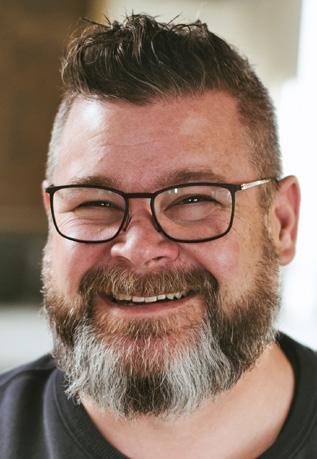




IN HIS LETTER to the church in Ephesus, Paul reminded the Ephesians that God “chose us in Christ before the foundation of the world” (Ephesians 1:4 NET here and throughout).
As if his point wasn’t clear enough, Paul in the very next verse adds, “He [God] did this by predestining us to adoption as his legal heirs through Jesus Christ, according to the pleasure of his will” (Ephesians 1:5). This is far from the only time Paul mentions predestination. In Romans 8:29 Paul talks about those who are “predestined to be conformed to the image of his Son.”
The doctrine of predestination is not limited to Paul’s letters. Acts 4:27–28 teaches that the death of Jesus at the hands of Pontius Pilate was predestined to take place. Meanwhile, the Old Testament is filled with passages that speak about God foreordaining things that were yet to come (Genesis 3:15; Genesis 12:1–3; 2 Samuel 7:12–16; Isaiah 46:9–10). No Christian can study the Bible and fail to recognize that God is sovereign over the past, present, and future.
And yet the Bible also makes it clear that while humans have real choices to make, God also holds us morally accountable for our decisions. In his final speech to the Israelites, Joshua famously reminded his listeners that they must “choose this day whom you will worship” (Joshua 24:15). Many years later, when Israel’s first king offered up an unlawful sacrifice, God told Saul that because of his disobedience, his kingdom would be taken away and given to someone else (1 Samuel 13:13–14). Shortly afterwards, David was anointed king in Saul’s place.
There are plenty of choices made by people in the New Testament as well. Peter, one of the most prominent disciples, had the unique ability to say something profoundly true and then follow it up with something so profoundly false that it elicited a sharp rebuke from Jesus (Matthew 16:13–23). And, of course, one can never forget the tragic choice made by Ananias and Sapphira that resulted in their deaths (Acts 5:1–11). Lying to the Holy Spirit was a serious
offence and both Ananias and Sapphira were judged for their sin.
Balancing the clear teaching of Scripture about God’s sovereignty over the entire universe with the equally clear teaching that humans are morally accountable for the choices we make is no easy task. It is something that Christian scholars have wrestled with for centuries.
Broadly speaking, Christian scholars have answered this question in one of three ways. Christians in the Reformed tradition (often referred to as Calvinists) place great emphasis on God’s sovereignty. They argue that all events, including our future free choices, are predetermined by God, and are used by God to bring glory to himself. Simply put, God knows the future because he decreed from eternity past everything that would happen. Presbyterian pastor R. C. Sproul, who passed away a few years ago, was one of the best-known proponents of this view.
Another large group of Christian scholars take a different approach. Classical Arminians argue that while God knows everything that will happen, he does not predetermine our decisions. Rather, God bases his actions on his absolute knowledge of our future free choices. In other words, biblical passages about predestination describe how God uses his foreknowledge to perfectly predict the future. Baptist scholar Roger Olson is a wellknown proponent of this view.
An interesting offshoot of classical Arminianism is known as Molinism. Molinists argue that not only does God perfectly know everything that will happen, but he also knows everything that could have happened in every possible situation. In other words, God knows counterfactuals. In this view,
pre•des•ti•na•tion /prē destә'nāSH(ә)n/ noun (as a doctrine in Christian theology) the divine foreordaining of all that will happen, especially with regard to the salvation of some and not others. It has been particularly associated with the teachings of St. Augustine of Hippo and of Calvin.
God uses his knowledge of all possible scenarios to create a universe where everything that happens accords with his plans. Apologist William Lane Craig is a prominent spokesperson for this view.
Finally, some Christian scholars take a different approach entirely and redefine the meaning of foreknowledge. They argue that just as omnipotence does not mean God can do logically impossible things (such as making a rock so big that he can’t move it), omniscience does not mean knowing things that cannot logically be known (such as future free choices). Open theists argue that it is time we accept that our future is open, not predetermined. Pastor and scholar Gregory Boyd has emerged as a prominent defender of this perspective.
Unsurprisingly, debates about this topic often get heated. As tempting as it might be to bury our heads in the sand and avoid discussing this topic, we cannot afford to do so. Rather, we must learn how to engage with other Christians in a respectful and productive way.
This fall, I’m teaching a course at Steinbach Bible College that hopes to bring greater understanding to this issue. Each major perspective will be thoroughly explored by examining the writings of some of its most prominent advocates. The goal is not to change minds, but to help participants better understand why other Christians believe what they believe about predestination and free will.
While Christians disagree on the precise meaning of predestination, we all agree that God is sovereign over the universe and that we are morally accountable for the individual choices we make. We must remember there is far more in the Bible that unites us than divides us.
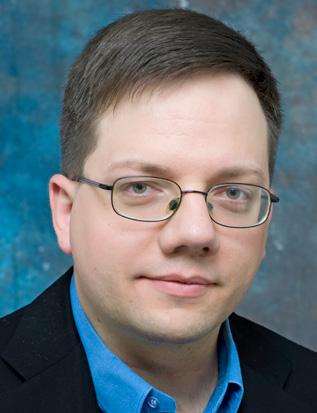
Michael Zwaagstra, BEd, PBCE, MEd, MA, is a public high school teacher and a member of Steinbach Mennonite Brethren Church. He will be teaching the Three Views on Predestination and Free Will course at Steinbach Bible College this fall. This course is open to the public. To learn more, visit sbcollege.ca.
GORDON UTZ WAS one of those guys who, like me, got into a little trouble in high school. Tall, handsome, hilarious and a good hockey player—I’m talking about me, of course (just kidding!). I’m talking about my classmate, Gord. Recently his brother Stan said, “You gotta talk to Gord; you won’t believe his story.” So I did. As we spoke, it was like we pushed rewind and were back in grade 10.
Gord Utz was raised by missionary parents who loved Jesus. He believed God was for real, but he just knew he could never measure up to this stern, judgmental God. His parents prayed hard for him. Maybe a Christian high school would pull him from his rut, and that’s where we met. A couple mischievous teenagers with doubts and questions.
After a year of rebelling, Gord was kicked out. He finished high school elsewhere, landed a job and began to party hard, like all his friends. But the life he thought he wanted was hollow, so he enrolled at Prairie Bible College and we were classmates again. After one semester, Gord found himself slip-sliding around the oil patch, living the fast life. “I think I was kicked out of every Bible college in Canada,” he says. “I didn’t fit with Christians, or in the party scene. I didn’t know who I was.”
He soon married Jenny and moved to Winnipeg, intent on climbing the corporate ladder. Before long, he had his own furniture store in the city of Portage la Prairie. There, Gord and Jenny raised a son and two daughters. “I made sure they went to church and Bible camp,” he says. “Maybe they could find what I was searching for.”
But desperation finds us all and, one day, Gord asked God to show up, to do something out of the ordinary. So it was that a local pastor, Glenn Loewen, walked into his store and handed Gord a sermon on tape, “The Father heart of God.”
“The Lord said I should bring this to you,” Glenn said. Gord was stunned. Had God answered his presumptuous request?
But the old patterns continued: work, drink, play—with all the toys a guy could want. At 48, Gord was an alcoholic, locked in an icy marriage teeming with bitterness

“I think I was kicked out of every Bible college in Canada. I didn’t fit with Christians, or in the party scene. I didn’t know who I was.”
and resentment. When his wife of 20 years announced she was divorcing him, he got angry. How could she hurt our family like this? he wondered. And why did God even create me? This was all his fault.
“It still amazes me how God can find and use someone who was lost for so long.”
One night, while climbing into another bottle, he cried out again for God to show up. An inner voice came on so strong he couldn’t ignore it. Digging out a long-buried Bible, he began to read, but the words seemed meaningless. Still, this voice persisted, so he pulled a devotional off the shelf. And there, in bold letters, was the one word he needed to read: forgiveness.
Ruth Bell Graham had five pieces of advice for dealing with a prodigal:
1. Have a plan. This included encouragement, open communication lines, and letting them know they are always loved and welcome.
2. Put your own walk with God first.
3. Remember that worship and worry cannot coexist, so be anxious for nothing, but in everything, by prayer and supplication, with thanksgiving, let your requests be made known to God.
4. Hold onto hope.
5. Miracles are God’s department, she said. Take care of the possible and trust God for the impossible. We cannot convict of sin, create hunger and thirst after God, or convert. These are miracles, and miracles are not in our department.
A voice seemed to say, “If you ask for forgiveness, I will forgive you.” Big, tough Gord began to weep. How could a righteous, holy God offer this arrogant, rebellious, sinful man anything other than judgment? But he prayed, “Forgive me, God.” And for the first time it was real.
Tell someone, he thought. So he searched the Yellow Pages, randomly picked a church, and found himself speaking to the same pastor who came into his furniture store the last time he asked God to show up. Tears flowed again as they talked and prayed, and Pastor Glenn showed him that there’s nothing we can do to make up for a lifetime to sin and guilt, but accept God’s gift of new life and live with gratitude.
One thing still festered. Gord found it impossible to forgive his wife. “As I read the Bible, and got to know Jesus better,” he says, “I saw myself in a new light. For more than 30 years, I did the same thing to God—rejecting and rebelling—yet he offered me forgiveness. I fought for months, battling anger and self-righteousness, until God finally brought me to the place where I could forgive Jenny, and ask her forgiveness for not loving her unconditionally.”
Gord began to pray, not for reconciliation, but that she too would know Jesus. With their daughter planning her marriage, they spent a little time together, and Gord said, “Jenny, if there’s even a glimmer of hope for us to be reunited, I’m all for it.” But she was in a new relationship now, and had no interest.
On a fishing trip, Gord and his older brother Stan prayed for each other’s families. Stan insisted on asking God to restore Gord’s marriage. “There’s no hope,” said Gord. But Stan continued to pray. When Gord’s flight landed back in Winnipeg, he rode down the airport escalator, looking for his son, who was there to pick him up. Instead, to his amazement, there stood Jenny with a sign: “There is a glimmer.” He couldn’t believe it.
Soon she told him of the night she tossed and turned, then finally surrendered to God and asked for forgiveness. It was the very same day his brother Stan had been praying for her. Six months later, the two were remarried in the church where people had prayed for two years for this miracle to take place.
Today, God in his mercy has redeemed this family, and Gord and Jenny are enjoying nine grandkids. Gord has taught Sunday school for a dozen years and often speaks at churches or camps.
When you sit in high school, you don’t think it’s possible that God could get ahold of you or the wild kids seated around you. “It still amazes me,” says Gord, “how God can find and use someone who was lost for so long. From the moment I surrendered my will to him, I have known without a doubt that I’m forgiven and valued as a son.”

Phil Callaway is a speaker, author and radio host, and is scheduled to speak at EMC Festival in La Crete, Alta., June 28–30, 2024. This article is taken from the radio broadcast Laugh Again with Phil Callaway (episodes The Prodigal Parts 1 and 2 which aired February 21 and 23, 2024, respectively) and is used with permission. Gord Utz is a member of Portage Evangelical Church and serves on the EMC Board of Missions.
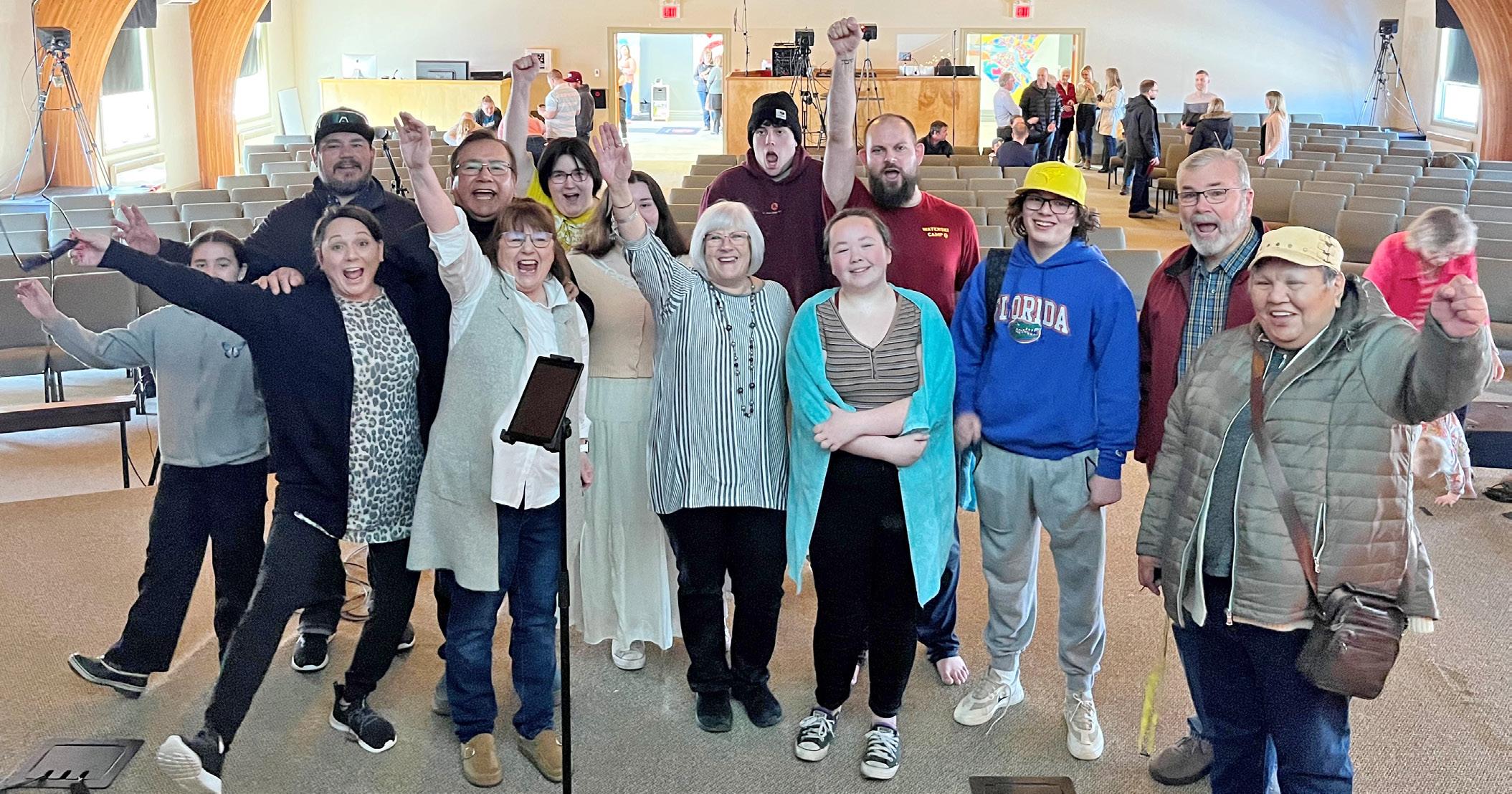
THE ST. MARY’S First Nation, where Venus Cote lives and does ministry, is inside the city limits of Fredericton, New Brunswick. It is home to the Maliseet people, or “people of the beautiful river.” Although the proximity of the reserve to the city makes it seem like it would be culturally similar to Winnipeg, where her aunt Elvira Cote works, Venus says it is very different and therefore ministry looks different as well. Mall outreach, for example, something Elvira does to connect with Indigenous Winnipeggers, is not a useful approach because, in Fredericton, people shop and leave.
St. Mary’s is a thriving community with employment opportunities for its members. “They have done well for themselves,” Venus notes. Education is highly valued because it is seen as essential to having a good career, meaning most of St. Mary’s residents have completed high school and many have post-secondary degrees as well. The community is well cared for.
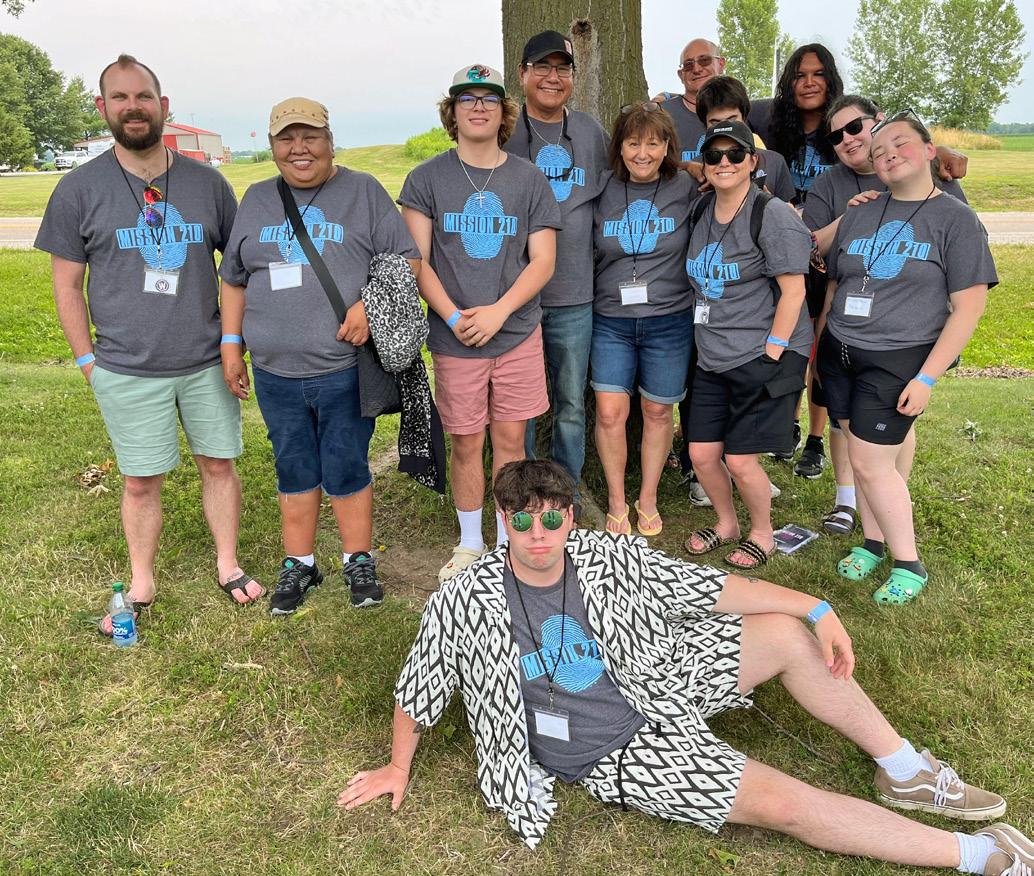
When Venus arrived in the Maritimes 34 years ago, she says she didn’t see evidence of alcohol abuse or other addictions on the streets, but that has changed. In the past ten years, there’s been a marked increase in substance abuse across Fredericton, the neighbouring Oromocto First Nation, and in St. Mary’s. Young people are particularly affected; deaths from overdoses are far too common, with fentanyl in particular bearing the blame.
Venus is especially saddened by some of the young parents who have become substance dependent, including some who accepted Christ eagerly as children when she taught them at camp years ago. Though addictions are present, they haven’t overrun St. Mary’s as they have other places, Venus says, because it is a community that cares for and helps each other. Oromocto has fared worse and it is a concern for Venus, who ministers there together with other believers from St. Mary’s.
SHORTLY AFTER VENUS moved to St. Mary’s from Nova Scotia more than 20 years ago, the couple she was there to assist moved away and she was left to make friends and start ministry on her own. She decided to start by connecting with people at the local Alcoholics Anonymous and, through the friends she made there, she learned about Martin and Sue Bear.
Martin and Sue, along with friends Richard and Melody and Donnie and Joy, were all new believers who had begun a Bible study. They were eager to learn and put their faith into practice and Venus was ready to encourage them and help in any way. “It was a privilege,” Venus says, to walk

alongside this group. Donnie, or “Papa Don” was a father figure and his influence was very important to First Nation Christian Outreach, the name of their group.
The Christian Outreach group continues to meet every Tuesday evening for a Bible study as they have since they began, with 15 to 20 people or more attending. It is a mixed group with both Indigenous and non-Indigenous people participating. Richard is a gifted musician and is in the process of opening a loft space called The Upper Room for Sunday evening services.
The primary ministry Venus is involved with now is the group of youth and young adults that the Bears, Merrill, Kevin and Venus lead together. They have been meeting since the young adults were kids, often in the school building but sometimes, as when we spoke, in Venus’ home for a supper-and-games night. They are walking with the Lord, they want to be
together, and they want to learn. Seeing them grow in their faith is a great encouragement to Venus and the other leaders.
Venus is currently struggling with poor kidney function—only about 20 percent. That, together with a cancer journey not long ago and several recent family tragedies, has been very tough for her, but she sees how they give her a way to demonstrate her faith to the people around her. One of these people is a woman who has gone blind and spends a lot of time alone at home. Venus is one of the few friends who stop in now.
Venus is grateful to the EMC Board of Missions and the churches for believing in her and supporting her. She sees EMC as an organization that loves its missionaries and does what it can to support them. She is excited to be at EMC Festival this coming summer and looks forward to meeting people and sharing about her work.
AS I READ newsletters, send emails back and forth, and have phone or Zoom conversations with EMC missionaries serving around the world, I have been inspired by several things. These are ordinary people from our EMC churches doing ordinary things in other countries. They’re also doing extra-ordinary things in the sense that they are doing everyday life but in cultures that do those everyday things very differently than the way we do them in Canada.
I’ve also heard that most, if not all, of them are consistently tired, burdened by the needs they see around them.
What I don’t hear from them is a pity-party, feeling sorry for themselves, or even bitterness that they are missing out on birthdays, graduations, new babies, and retirement parties of friends and family back home. They have felt called by God to do this work and are overflowing with stories of God-moments in their lives.
One theme that I hear regularly is a request for more workers to join them in their ministries. The needs are vast, and the workers are few. They are praying for more help, and while they are so grateful for the support they have from their sending churches, they would love to have EMC churches send more workers.
What kind of help do they need?
People who are willing to do children’s ministry, youth ministry, home Bible studies, and music ministry. They would really appreciate people who are trained counsellors, business
entrepreneurs, schoolteachers, Bible translators, curriculum developers, disciplers, pilots and mechanics, agriculture specialists, nurses, midwives, and the list goes on.
But invariably the qualifications that they are looking for have nothing to do with the skills and gifts that workers may have, but something of far greater value. That is, they are looking for people with godly character, people who have a teachable spirit, people who are adventurous and self-driven, who know how to build relationships, who are resilient and innovative.
They are looking for people who love Jesus and have a burden for the lost. People who spend time in prayer and worship. People who have boundaries but are also flexible in their approach to life. They want team members who will not become hard-hearted
with all the brokenness and stories of trauma that they hear. These are the types of workers that our EMC missionaries pray will join them and, Lord-willing, expand and move their ministries to greater levels of discipleship, to go to new regions of the world where the person of Jesus Christ is not known, to establish new ministries that meet the ever-changing dynamics of our world.
So, on behalf of our 90 EMC missionary units serving the Lord in career missions, I say thank you. And on their behalf, I invite you to continue identifying, equipping, and sending out more workers to expand the reach of the gospel to the ends of the earth.
As EMC Director of Global Outreach, Gerald Reimer supports EMC missionaries all over the world.
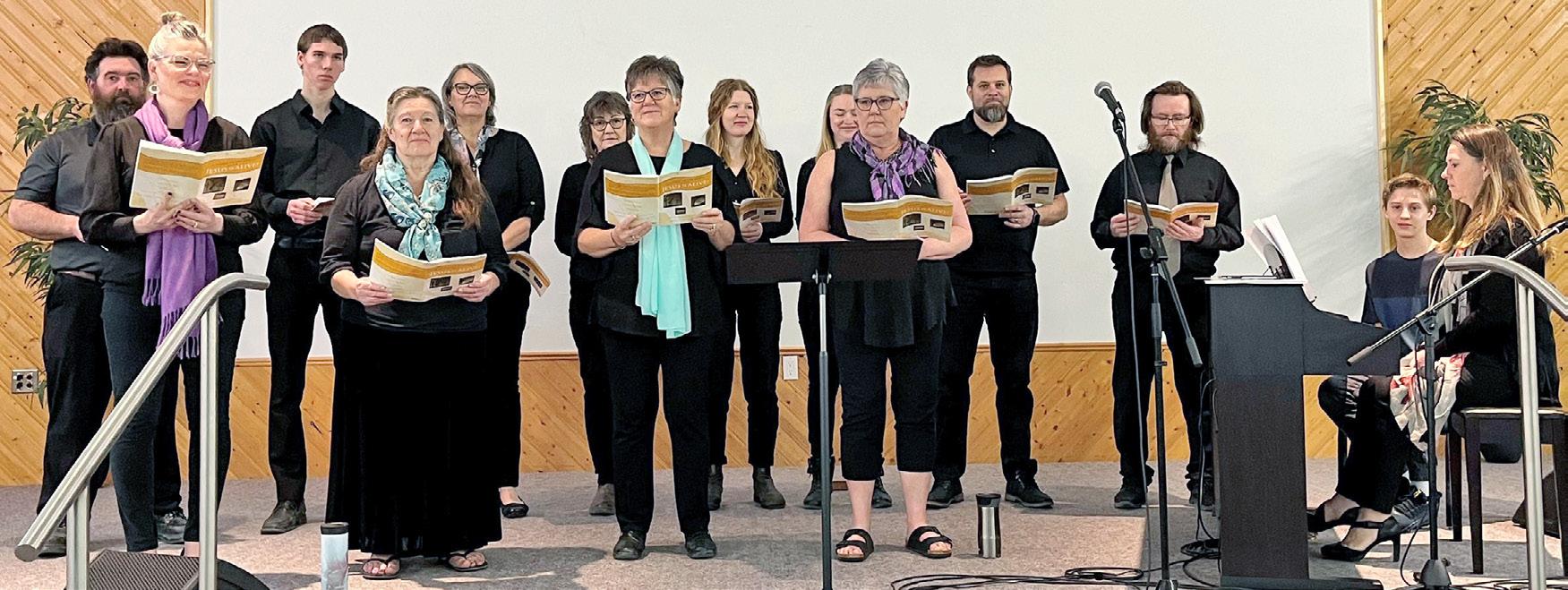 Roseisle EMC
Roseisle, Manitoba
Roseisle EMC
Roseisle, Manitoba
THE HOLY SPIRIT has definitely been at work in our midst. We had three baptisms in 2022, and three in 2023. We pray for more this summer. There has been much interest in the catechism classes that Pastor Fernando Hiebert hosts every Sunday during the winter months.
Our weekly attendance has increased in the last few years, with many new families joining us for both Sunday school and the morning service. We continue to fellowship with each other with a potluck breakfast, called Mugs & Muffins, on the last Sunday of the month. It is so good to form new friendships with fellow believers.
Our youth group continues to be active every week, with a core attendance of about 15 young people. Activities are varied and include worship evenings, youth retreats, movie nights, or just hanging out at the church. Our youth are led by a dedicated group of adults who weekly show
God’s love and mercy to the young people around them.
We pray God’s love is evident through our community outreach. In March, our congregation provided meals for 50 students at YFC Carman (The Back Door), as well as for two local families in need. We also helped to serve at the Carman community supper in February. Our church was responsible for services at the Boyne Lodge in January. Our ladies’ fellowship hosted our annual perogy supper
Roseisle EMC’s Easter choir performs on March 31, 2024.
at the end of April; funds raised go to local missions and church projects.
On Easter Sunday our sanctuary was buzzing with people who enjoyed a potluck breakfast and stayed to celebrate Christ’s resurrection. An Easter choir was formed again this year, and we were blessed with a wonderful performance. The best part was when the choir announced that they weren’t singing for the benefit of the audience, they were doing it for the glory of God. Amen!
– Michelle Cenerini
Celebrate with Abbeydale Christian Fellowship (formerly Forest Grove or Forest Lawn EMC) 1352 Abbeydale Dr SE, Calgary, Alta. September 22, 2024 more information at https://abbeydale.org
50 years
Straffordville EMC
Straffordville, Ontario
STRAFFORDVILLE EMC IS growing! We are so thankful for an addition to our pastoral staff. Pastor Paul Penelton joined our team as associate pastor on December 5, 2023. We formally welcomed him and his wife Cathy on December 10.
On March 31, 2024, we welcomed five new members and witnessed three individuals get baptized.
Baptized were Derek Harms, Hannah Peters and Cohen Harder. Received into membership were Henry and Nancy Klassen, Harrison Cooper, and Cathy and Pastor Paul Penelton.
– Margaret Berg

Straffordville EMC grew on March 31, 2024: Derek Harms, Hannah Peters and Cohen Harder were baptized. Received into membership were Henry and Nancy Klassen, Harrison Cooper, and Cathy and Pastor Paul Penelton. Standing with them are Margaret and Pastor Abe Berg.
Evangelical Fellowship Church Steinbach, Manitoba

Four couples partipated in a parent-child dedication on April 14, 2024: Jonathan and Nelly Waagenaar, Aloysius and Diana SeSay, Brian and Lindsey Thiessen, and Caleb and Robyn Buhler. We are grateful for how God has blessed us with all the different generations represented in our church.
– Ernie Koop
The Messenger is an
Wins in six categories for articles, podcast published in 2023
STEINBACH, MAN.—ON MAY 3, 2024, Canadian Christian Communicators Association (CCCA) announced their awards that names the best work of its member community for 2023. The Messenger (and EMC) won in six categories:
THIRD PLACE: PODCAST
The Armchair Anabaptist season 1 with co-hosts Kevin Wiebe and Jesse Penner
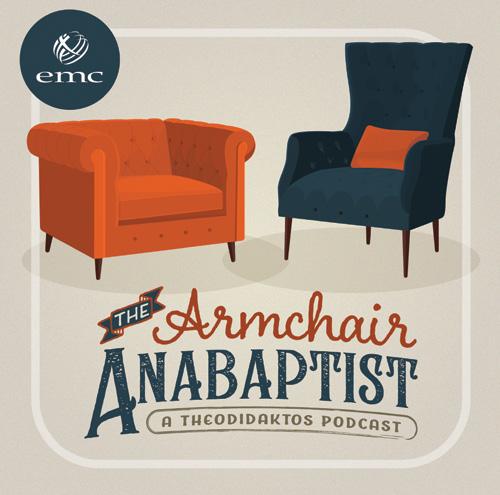



THIRD PLACE: COLUMN
Further In and Higher Up (regular column) by Layton Friesen
THIRD PLACE: FEATURE “Walking through deconstruction” (July/Aug 2023) by James Driedger






EMC well represented with nearly one-quarter of attendees
“PEOPLING IS HARD,” said main speaker Connie Jakab at the first session of Awesome KidMin Conference 2024. And, she said, “It’s gotten even harder post-COVID.” Yet Ecclesiastes 4:9–12 emphasizes the importance of community.
On March 8–9, just over 200 people gathered at Eastview Community Church in Winnipeg, Man., with the theme Anchored in Community. Attendees had opportunities, through main sessions and breakout sessions, to receive training and resources in children’s ministry. Of the attendees gathered, nearly one-quarter were from EMC churches, with a few coming

I felt spiritually renewed and excited about our ministry. – EMC participant comment

from as far away as Bow Island and Picture Butte, Alta.
During the first session on Friday evening, Community Starts with Me, Jakab reminded attendees of their responsibility in creating and upholding community. Using the analogy of two people who each hold one end of a rope, she said we can choose to keep holding onto our end of the rope no matter what someone else does with their end of the rope.
Saying, “we teach what we know but we reproduce who we are,” Jakab encouraged those in attendance to “invite God into our emotional
suitcase” and to allow ourselves to be known.
When attendees gathered again on Saturday morning, they heard from Jakab on how Community Starts with Jesus. Jakab asked how we can bring down barriers in building community around Jesus. Our goal as translators to an unchurched generation, she said, is not for people to be “churched” but for them to know Jesus.
Saying Jesus didn’t work from fear, control or punishment, Jakab encouraged attendees that when we notice ourselves going to that, it’s important to acknowledge without judging. The
more we live in his love, she said, the less we live in fear. Jesus’ love turns fear into courage. “I’m not afraid,” she said.
Attendees then had three opportunities to choose from a variety of breakout sessions on topics ranging from the role of brain science in children’s ministry, to apologetics, to teaching children to pray, and much more.
Regathering for the closing session, Community Starts Together, attendees heard from Jakab on how even in brokenness, there is still a vibrancy in Jesus. From John 11:38–44, Jakab highlighted how Jesus took a moment to identify with the emotions of Lazarus’s sisters. And just as Jesus told
The Not Too Young breakout session was very encouraging. Her testimonies about young students showed it is worth teaching little ones and, yes, they do and
– EMC participant comment
them to take off Lazarus’s grave clothes, she said, we are called to reveal each other’s true selves. Closing with “when I encourage, you get courage,” Jakab told attendees to turn to their fellow ministry team members and speak encouraging truth over them.
The planning committee has announced the conference in 2025 will take place on March 7 and 8, and once again be hosted by Eastview Community Church
– Rebecca Roman

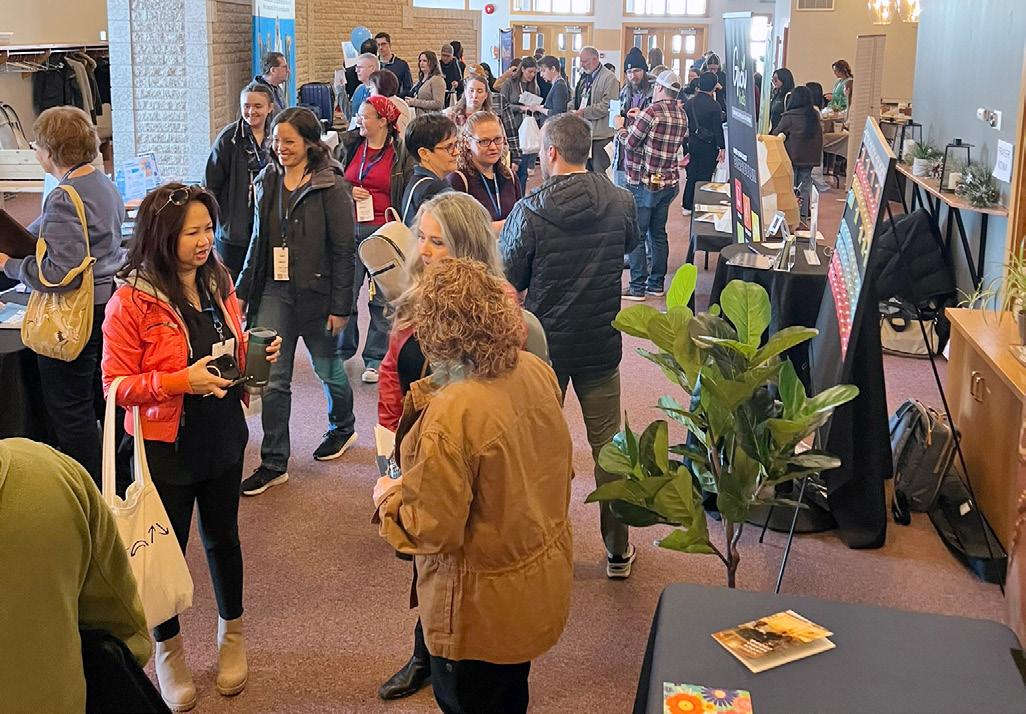


STEINBACH BIBLE COLLEGE concluded its 2023–24 school year by awarding a hard-working collection of servant leaders with their Bachelor of Arts, Associate of Arts, and Certificate degrees during graduation weekend on April 26–27, 2024.
A total of 33 graduates received their diplomas from Dave Reimer, who handed out degrees for the first time as president of Steinbach Bible College.
“We are honouring you today for the significant work that you have done to arrive at this milestone in your lives,” Reimer said. “We thank God for each grad from our college today; for the lessons learned, the mind developed, the character shaped, and for the people they’ve become and are still becoming.”
The annual Spring Showcase took place on Friday, April 26, where students, staff, faculty, family and friends gathered on campus for a night of worship, singing, skits and an interview
continued on next page

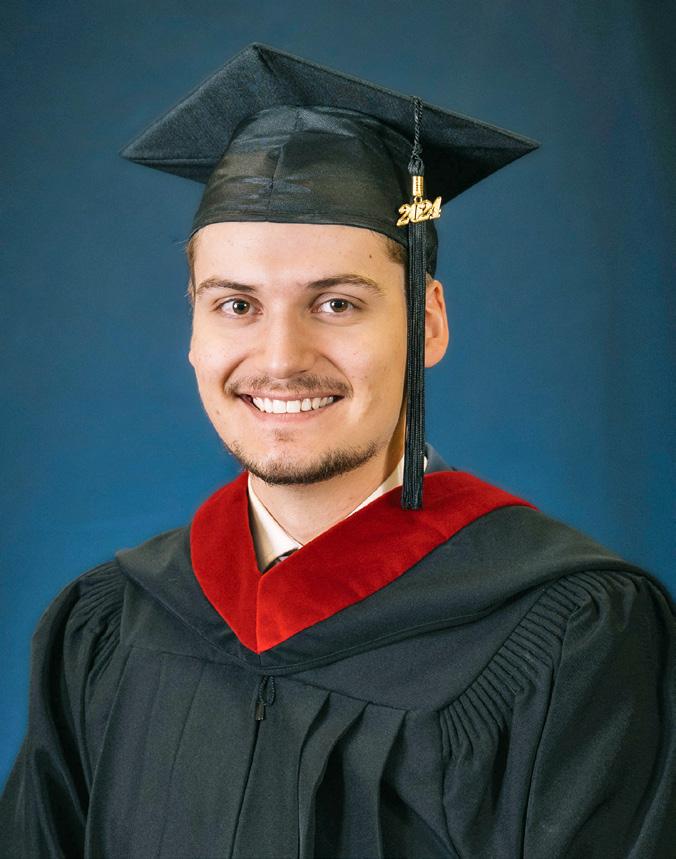
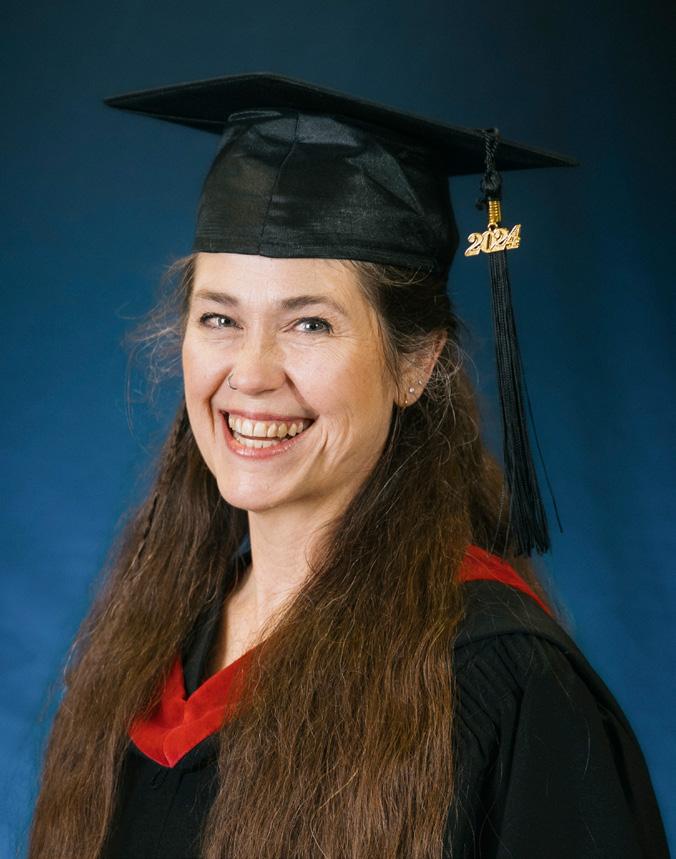
EMC grads (clockwise from above left): Nathan Bartel, BA Biblical Studies (Rosenort EMC); Ruth Dyck, BA Biblical Studies (Riverton Gospel Chapel); Koleton Peters, AA Pre-University (St. Vital EMC); Sarah Neufeld, AA Biblical Studies (Steinbach EMC); Jonathan Loewen, AA Biblical Studies (Rosenort EMC)

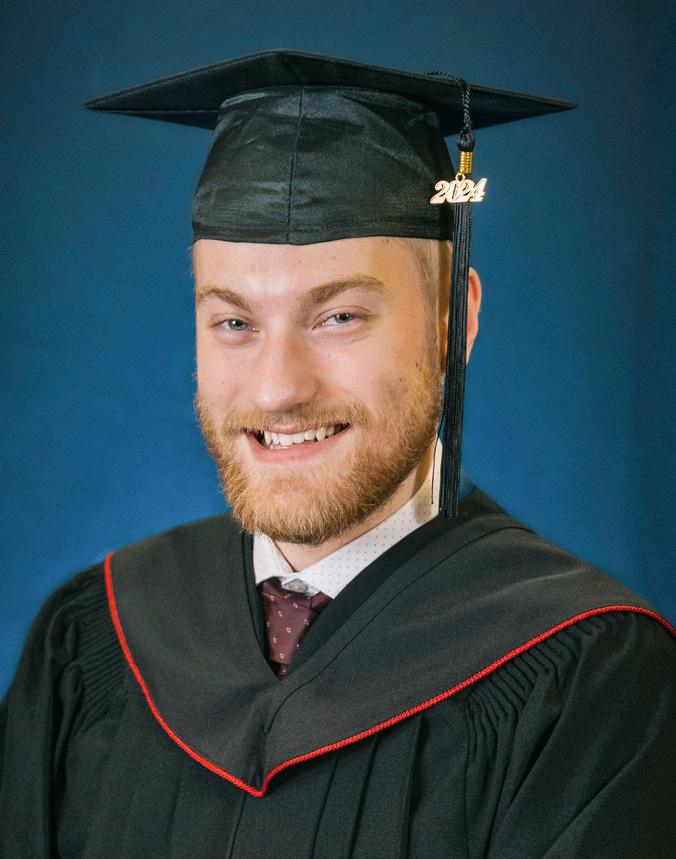
with the SBC kitchen staff. Seven students were honoured during this night for completing their one-year Certificate of Biblical Studies or the Pursuit XL degrees.
The next day, the SBC graduation ceremony was once again held at the Emmanuel Evangelical Free Church in Steinbach, Man. Twenty-six Associate of Arts and Bachelor of Arts graduates were honoured during this time, with a banquet following the conclusion of the service.
Nathan Bartel, who is originally from Rosthern, Sask., was chosen
as this year’s grad valedictorian. He expressed that it was an honour to be graduating, especially alongside this year’s class. “When I look at [this class] I see a diverse collection of people, each on their own story and their own journey,” he said.
“We come from many different backgrounds, starting our journey each in different stages of life. For a short time, we have gathered together here at SBC and our stories have now been written together,” he said. “This graduation is the culmination of this beautiful harmony. I feel privileged to
STEINBACH BIBLE COLLEGE is saying goodbye to long-time Bible professor, worship instructor and registrar Arlene Friesen.
Arlene and her husband Jacob are moving on to the next ministry Christ has called them to, and the college will miss her.
Arlene is passionate about profound, heart-deep worship that draws the worshipper into the story of Jesus. We will miss her alto voice leading from wherever she sits in chapel. She loves exegesis, and has inspired a generation of students with her Bible teaching, particularly her exposition of the gospels. She is a formidable academic administrator whose grasp of the intricacies of academic degree requirements gained the respect of faculty colleagues. She is an eloquent preacher whose sermon recently set
SBC professor
Arlene Friesen at the SBC Showcase event in 2023.
be a small piece in each of their stories.” Bruce Penner, chair of the board of directors at SBC, was the guest speaker. He spoke on the theme that the student body chose for the year: “Remember Your Creator,” rooted in Ecclesiastes 12:1. “As you graduate from Bible college, you have chosen a theme that is elegant in its simplicity and which completely and perfectly applies to every aspect of every life that has ever been lived,” Penner said.
He left the grads with an encouragement: “Remember your Creator; in theory, and in practice.”
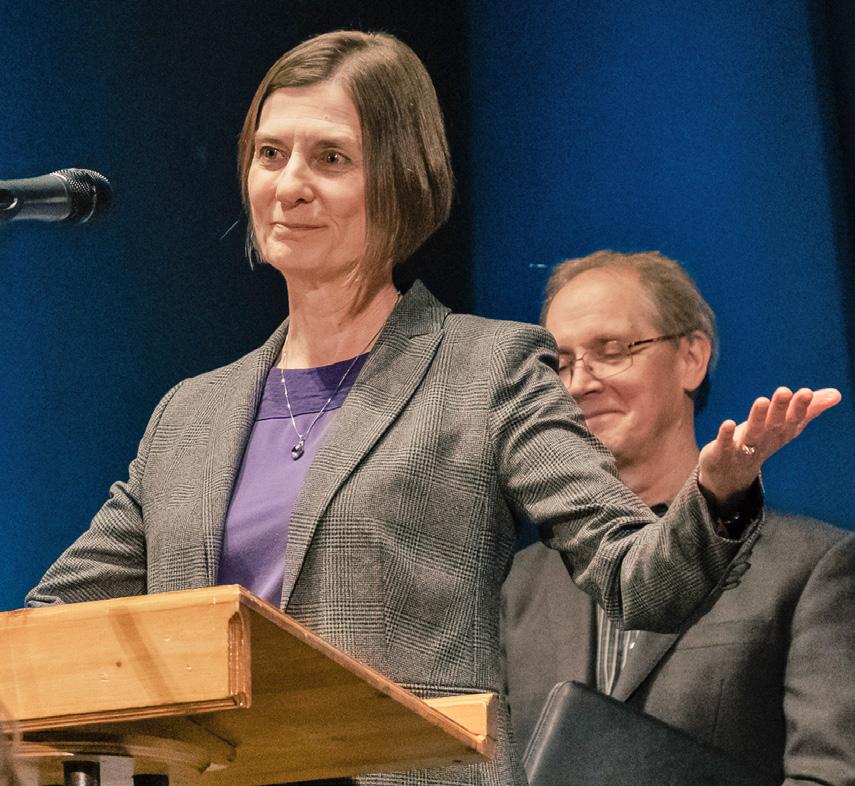
Revelation 21–22 on fire for the student body. She loves cross-cultural ministry and has been a leader in intercessory prayer for the witness of Jesus across the world.
Arlene has led our first-year Mission Exposure teams to inner-city Winnipeg for many years. Students have appreciated her quiet, attentive way of listening to them and responding with spiritual direction that is honest and life-giving. Arlene presents the
church with a prophetic challenge. Here is someone who lives as though the Bible, worship, teaching and service are exalted realities worth giving one’s life to completely. If her life is true, what does that mean for the rest of us?
We thank God for lending Arlene to SBC for these years and we send her out with gratitude and prayers.
MCC’s partners in Myanmar provide food, work for peace amid armed conflict
EVERY DAY, WHEN Mr. Khong awakens in Myanmar, he has two challenges: One, avoid being captured, conscripted or killed by the military junta that is struggling to hold onto its power to govern. Two, get food to people who have fled to remote mountainous areas of the country to avoid the reaches of the junta.
Khong, who asks that his real name not be used, recently described the insecurity and desperation he and many other people feel today in Myanmar, formerly known as Burma. He spoke on Mennonite Central Committee’s (MCC) podcast Relief, Development and Podcast about the violence and hunger that have become pervasive in the years since the military took control in 2021.
“Whenever there is engagement between the military and civilian people, how the military treats the people is very violent,” says Khong, who works with one of MCC’s partner organizations. “You know, they will slash, they will punch, they will even kill. We have already experienced unlawful arrest. In this situation, everyone can be arrested and, actually, the military can shoot anyone, anytime, even in the largest city. They don’t need justification. There’s no rule of law anymore.”
In February, after a string of defeats, the military reinstated national conscription for all men, ages 18–35, and women, ages 18–27. As a result, people are lining up for passports to leave the country, hiding in remote areas and slipping out of the country to avoid
conscription. The military sometimes will use people who can’t fight to clear a field of land mines ahead of the troops, Khong said.
He says he is especially at risk because he does human rights and peacebuilding work and provides humanitarian assistance.
The military has outlawed distribution of humanitarian goods because they believe humanitarian workers are supporting the resistance, he says. Yet as a Christian and as a peacemaker, Khong feels he has no choice but to help people in need.
MCC supports the work of its partners, who provide essential food items, basic medical supplies, child education and income generation assistance. They also are using the education MCC has provided to work for peace and to teach peacebuilding at the grassroots levels.

Food parcels are prepared for distribution to internally displaced people in Myanmar. (The person in the photo is not named for their protection nor are they the person named Mr. Khong in the story.)
As a Christian and as a peacemaker, Khong feels he has no choice but to help people in need.
The personal fulfillment Khong feels while doing meaningful work for his country, his community and the churches outweighs the risk.

“The people of Myanmar cry out for peace,” says Charles Conklin, MCC representative for Myanmar and Cambodia, “but they often feel that their cries go unheard. MCC has been a witness to the suffering and hopes of the people of Myanmar—hearing their cry for peace, supporting them, and advocating for them.”
Khong says he learned through peace training that feeding people is one way to bring peace.
“Not just one people is getting hungry, the whole population, millions of people (are) getting hunger,” Khong
says. People, including his mother and grandparents, have moved to remote areas to get away from air strikes and other violence, making a stable income unlikely. Farming is unsafe, too, because of land mines. People are in debt to each other to be able to pay for necessities.
By providing food, Khong says, recipients get a little relief from the ongoing physical and mental stress of war. Families who didn’t have enough rice for a week now have enough for a month. They can eat more than once a day. Although he doesn’t have statistics to prove it, he believes having food decreases domestic violence.
Food comes in the form of money, Khong says. Church leaders organize humanitarian support teams in each village. They use the electronic funds that MCC’s partner sends to buy food from a local market and distribute it. When no market is available, support teams distribute cash so displaced people can buy food from those who have it.
“We need to do humanitarian (distributions) very secretly. It’s very low profile, you know, telling no one,” Khong says. Yet, he and other pastors believe that “being riskless is not always the will of God.”
As of now, he says, the personal fulfillment he feels while doing meaningful work for his country, his community and the churches outweighs the risk.
“The donation from MCC has been a miracle to us. And it also inspires us,”
he says. “We still believe in God, and we thank God that we have our faith brothers and sisters like MCC who are committed to this work.”
Conklin says he admires the commitment of MCC’s partners who put their lives on the line every day to provide sustenance, to care for people in need and to teach techniques on how to end cycles of trauma, violence and hatred.
“Our partners have been resisting the call to violence ever since the military coup in 2021, despite pressure from neighbors to take up arms against the junta,” says Conklin. “They have been preaching peace as the only viable path forward for their society
“Now they, their families, and their communities are at risk of being drafted to fight on the other side of the conflict,” he says. “In response, they have asked us for resources on conscientious objection. We are once again humbled by their bravery and conviction, that even now they plan to stand up and say no to war despite the extreme personal risks.”
To hear more from Khong in his own words, listen to the April edition of Relief, Development and Podcast wherever you get your podcasts or visit mcc.org.
– Linda Espenshade
Linda Espenshade is MCC U.S. news coordinator. Meghan Mast, multimedia storyteller for MCC Canada, interviewed Mr. Khong.

1926–2024
Jacob was born October 28, 1926, to Aron and Maria Fehr in the Mennonite Village of Chortitz, Sask.
Dad attended Versailles school a mile north where he finished the eighth grade. Dad was a serious student who enjoyed school. He loved math and spelling.
Dad received his first harmonica at age seven; thus began his love for music and entertainment. It was his harmonica music that got Mom’s attention! Dad and Mom were married October 10, 1948. They enjoyed 70 wonderful years together.
Dad and Mom raised their family of seven children on an acreage in Chortitz where they grain/cattle farmed, ending their years there fulfilling their dream of having a dairy. Mom managed the family and farm while Dad worked a full-time job away from home to help sustain the farm. His work through the years included a section man on the CPR, CP shops in Swift Current. He studied and achieved his 4th class power engineering working in the boiler room at the Comprehensive High School.
In spite of the business of life, dad and mom always found time for family and friends. A vacation we will always remember was taking the family to Banff (hot springs/gondola) and Calgary (zoo) on the train.
Dad and Mom built a new home in Swift Current for retirement while Dad still worked a final job as head custodian at the high school. They invited relatives and friends to visit and enjoy games and their Mennonite cooking. They had a passion to help their children succeed taking time to help with special projects/visits. Together they volunteered at the Mennonite Heritage Village, spent a winter in Pennsylvania volunteering for Ten Thousand Villages (MCC), and took trips to Ukraine, Bolivia, Belize, Mexico, Inuvik NWT, Nashville, and Hawaii.
Dad set the ultimate example through life by demonstrating his work ethic and integrity. He became an avid horseshoe player, competing in places like Manitou Beach, Montreal, Victoria, and Vegas. In his 60s he purchased a computer, learned to type, and started writing stories and poems for family and friends in English and Low German. He published 15 books with his writings and put several of his books on CDs.
Dad’s commitment and love for Mom was evident as he visited her at the Meadows several times a day in her last two years. While alone at home, he started cutting squares out of jeans for MCC. He cut squares until he went into the hospital three weeks before he passed away. His worked produced 1,331 kits (enough for 1,331 queen size blankets).

Dad lived his last years with daughter Sandra and her husband Harold in Calgary. We were blessed in his later years to hear him praying for his children/grandchildren by name. He often questioned, “Why am I still here?” In his final year his prayer was, “Help me to do what is honouring and pleasing unto you.” Jacob was predeceased by his wife Agnes in 2019, and daughter Kathy in 2009. He is survived by three sons, Jim (Lily) Fehr, Robert (Elsie) Fehr, Gerald Fehr, and three daughters, Sandra (Harold) Friesen, Brenda (Bob) Penner, Susan Fehr, thirteen grandchildren and eighteen great-grandchildren.
Dad peacefully entered eternity March 12 at Dulcina Manor at the age of 97.
– The Family
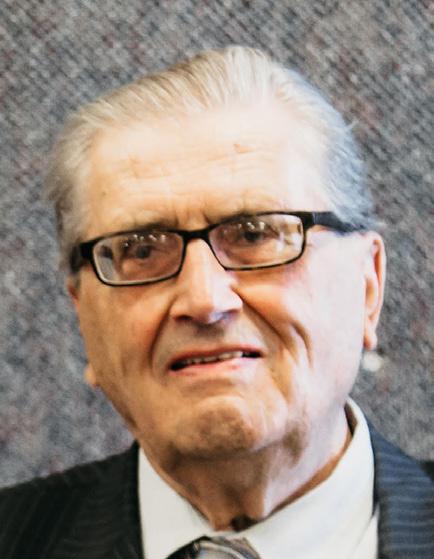
1931–2024
“For to me, to live is Christ and to die is gain.”
(Philippians 1:21)
Joas D. Plett of Arborg, Man., father, grandfather and great-grandfather, passed away peacefully at the home of his son in Selkirk, with family by his side, on March 20, 2024, at the age of 92 years and 10 months. His last words spoken minutes before his passing were, “Lord, take me home to heaven.”
He was predeceased by his wife of 65 years, Mathilda; his parents John R. and Sara Plett; stepfather, Jacob U. Kornelsen; one grandson, Kenneth Plett; one daughter-in-law, Regina Plett; one great-grandson, Eli Kroeker; six brothers and three sisters.
Dad was born on May 14, 1931, near Blumenort, the fifth of nine children. Dad went to public schools nearby and completed eighth grade. When he was 11, his dad passed away suddenly. This loss had a formative impact on his life. His mom remarried Jacob U. Kornelsen, a widower with two children, five years later, bringing lots of change to the family. When Dad was 18, he moved with the family to Quellen Colony, Mexico.
His young adult life was filled with worldly living. However, when he noticed Mathilda Kornelsen, he realized his life would need to change if he wanted a future with her. On January 1, 1956, he committed his life to his Lord and Saviour, Jesus Christ. He was baptized in the Kleine Gemeinde Church, March of 1956. On April 29, he married his sweetheart, and they started a family.
In 1964, Dad and Mom packed up their four children, and moved to Morweena, Man. They bought a farm that fall, and Dad worked hard to provide for his growing family. He started with turkeys but progressed to farming laying hens, along with grain and cattle. Family was important to Dad. He ensured his nine children attended the private school. Dad was a man of integrity, known in the community for his honesty, both in the church and in farming. His bookkeeping was very detailed, and he chose to embrace technology as it was introduced over the years.
In 2001, Dad moved off the farm, beginning the transition of handing the farm over to his youngest son. He continued to do the bookkeeping for the farm until 2018. These years of transition involved helping on the farm, gardening, and hosting many family gatherings. In 2017, Dad and Mom moved to House of Hope in Arborg. As his health declined following mom’s passing in 2022, he eventually moved in with his second oldest son, where he remained until his passing.
He will be lovingly remembered by his nine children and spouses: Leanna (Gilbert) Gueret of Steinbach, Delmer (Janice) of Arborg, Ernie of Selkirk, Reynold (Janice) of Arborg, Sara (Henry) Reimer of Arborg, Milton (Valerie) of Arborg, Violet (Lyndon) Reimer of Arborg, Myrna (Marlin) Huber of Brownfield, Alta., and Eleanor (Abe) Neufeld of Seminole, Texas; 46 grandchildren and spouses; 35 greatgrandchildren; and one sister.
– The Family

Please send all position ads (150 words or less), including pastoral search ads, to messenger@emconference.ca. Ads may be edited. Please advise us when it is no longer needed.
Often there are more churches looking for staff than are identified on this page. For information on additional openings, contact Conference Pastor Andy Woodworth (awoodworth@emconference.ca or phone 204-326-6401).
Pastor: Hillside Christian Fellowship (near La Crete, Alta.)
Hillside Christian Fellowship is seeking a pastor. HCF is an EMC affiliated congregation located in a beautiful farming/logging community near La Crete, Alberta. We are a small rural multi-generational church with average Sunday attendance of 50; about 15 of this number are young children.
The pastor would be working with a lay minister and a small ministerial. He would have appropriate Bible college education. Some pastoral experience would be an asset. He would agree with the EMC Statement of Faith and Church Practices.
Besides preaching, teaching, and administrative duties, he would be expected to do visitation.
For more information or an expression of interest please contact Henry Driedger (Board Chair) at 780-502-3272, Peter Janzen 780-841-9762 ( ptjanzen@ yahoo.com ) or Peter Doerksen (EMC Western Ambassador) at 250-570-2969 or pdoerksen@emconference.ca.
Pastor: Anola (Man.) Fellowship Chapel
Anola Fellowship Chapel is in the RM of Springfield at 58006 Monominto Road, 5
miles southeast of the community of Anola and 35 minutes east of Winnipeg. Our mission is to love God, love our neighbours, and make disciples. We have a full Sunday program and both children and youth programs. We are active in various community events. We are actively seeking a full-time pastor. We are looking for a spiritually mature man with a deep personal walk with Jesus, an engaging, enthusiastic individual who demonstrates sound biblical teaching and in-depth preaching as well as vision. Contact Landon Elhard at afcpastorsearch@ gmail.com for more information and/or full job description. Check out our website at anolachapel.com.

Taber Evangelical Church is actively searching for the senior pastor whom God has chosen to lead us into the future. Taber EMC is a unique, growing, family-oriented church. Our regular Sunday attendance is about 250. If you feel the Lord leading you in this direction please email taberemcpsc2@ gmail.com or contact Bram Klassen at 403-331-9563.

Prairie Grove Fellowship Chapel, serving Lorette, Manitoba and the surrounding area, is seeking a full-time senior pastor for a congregation of approximately 60. We are a friendly, welcoming church with a heart for our community. Our mission is “To Love God and To Love People”. Our desires for a pastor:
• Loves God, his Word and has a close relationship with him.
• Loves people and is eager to serve and invest in them.
The EMC national office is seeking an administrative assistant to work as part of the office team. Applicants should have a passion for Christ and the mission of the church.
This role provides administrative support and contributes to the efficient day-to-day operations of the office. This position will primarily support the Conference Pastor, Director Next Generation, and Director of Communications and Administration and includes some work with finances, media, events and projects. Qualifications include experience in administrative support, strong computer, written communication, organizational and interpersonal skills. Education or experience in media and financial operations would be assets. Bible college certificate or degree preferred.
This is a full-time position offering equitable pay and benefits with opportunity for professional development.
Please send a resume and completed application form to applications@emconference.ca. (application forms are available at http://www. emconference.ca/serve/ or by request from applications@emconference. ca.) Applications will be accepted until a suitable candidate is found.
• Is able to teach.
• Is a team player and team builder. Is aware of his personal weaknesses, his freedom in Christ and addresses his weaknesses with intentional accountability.
• Has pastoral gifts that are recognized by those around him. Cares for his family, being faithful to his wife and nurturing his family
For an information packet please contact: pgfcpastorsearch@gmail.com.

Lead Pastor: St. Vital EMC (Winnipeg, Man.)
St. Vital EMC is looking for a lead pastor beginning summer of 2024. Our church is located at 2005 St. Mary’s Rd in Winnipeg, Man., with an average Sunday attendance of 100. We are looking for a leader who is guided by the Holy Spirit and exhibits the qualities in 1 Timothy 3:1–7 and Titus 1:5–9. Our church works as a team where the board and pastor(s) set the agenda, but major decisions are made by members. The lead pastor does most of the preaching but shares the pulpit with other leaders. The lead pastor would be part of a paid team with the associate pastor and secretary.
Job ministry descriptions are available upon request. Education, experience and agreement to the EMC Statement of Faith will be considered. Interested applicants are encouraged to contact Mike Hopcraft at pastoralsearch@svemc.org in addition to submitting your cover letter and resume.
Pastor: Morris (Man.) Fellowship Chapel Morris Fellowship Chapel is a Christfollowing, Bible-believing, family-friendly church of around 130 people in the small rural town of Morris, Manitoba. People of
all ages are a part of Morris Fellowship, including children, young adults, adults and seniors. We are looking for a pastor to help with preaching, teaching, and building community in our church. This would include preaching on Sundays, teaching midweek Bible studies, personal visits and church community events. Contact Cliff Reimer, Pastoral Search Committee Chairman: cliff0955@gmail.com.
Lead Pastor: Morrow Gospel Church (Winnipeg, Man.)
Morrow Gospel Church is pleased to announce that we are now accepting applications to fill the role of lead pastor. We are a part of the EMM Conference and are looking for someone who subscribes to our statement of faith. If you or someone you know whom you feel would be a good fit for this position, we encourage you to reach out to them and encourage them to apply! To request more information please visit www.morrowgospel.ca

Lead Pastor: Gospel Fellowship Church, (Steinbach, Man.)
Gospel Fellowship Church is seeking a fulltime lead pastor. We are a congregation with an average attendance of 75; our church is a part of the Evangelical Mennonite Mission Conference (EMMC). GFC is a faith community in a broken world, sharing the hope of freedom in Christ. We are searching for an individual who passionately loves God and loves people, one who is able to provide vision and direction for our church, and willing to compassionately lead our congregation with sound biblical teaching.
For a full position description, please visit our website (www.gospelfellowshipchurch.ca) or contact us at applications@ gopselfellowshipchurch.ca
Pastor: Carman Mennonite Church (Carman, Man.)
Carman Mennonite Church invites applications for a full-time lead pastor. We are a congregation of 60–70 active members with regular adult and children’s Sunday school. We are looking for someone who models a sincere Christian faith, exhibits strong relational skills and community mindedness.
Duties include preaching, teaching, pastoral care, visitation with those in care homes, connecting with the community and area ministerial, working with the worship committee, fostering a love for and nurturing disciples of Jesus the Christ. This would be done with the support of lay leadership. For more information see carmanmennonite.ca. Forward inquiries and/or resumes with two references to: cmcpastoralsearchcommittee@gmail.com
Lead Pastor: Lakeview Community Church (Killarney, Man.)
Lakeview Community Church is looking for a full-time lead pastor. We are a Mennonite Brethren Church located in Killarney, Manitoba. We are seeking an individual with some experience in this field, who subscribes to the Mennonite Brethren Confession of Faith. We are looking for someone to become a part of our community, who can preach the Word of God as well as teach and guide our congregation to live like Jesus. Please send resumes to lvccpastorsearch@gmail.com

For a more comprehensive job description and church profile, please check this link https://boards.com/a/hR1RS.Hx4srs
His light to my path • By
Karla HeinAT THE BEGINNING of this year, I read that DaySpring, the greeting card company, had a Word of the Year Quiz on their website. By selecting a few personal descriptors and Bible verses that resonated with me, I could find a prebaked, pithy word to construct my life around for the next 365 days (366 with the leap year).
The word I received? Celebrate. Perhaps a subtle, marketing ploy to sell more greeting cards for the less popular holidays?
While I didn’t remodel my resolutions after the arbitrary word, I did ponder it. The last few years have served a smorgasbord of challenges to most of us. I’ve found surprising encouragement from the admonition “the Lord disciplines the one he loves” (Hebrews 12:6). The stretching and breaking I’ve experienced has been measured from the wise hand of Love. The Good Shepherd has provided relief and nourishment for me in the presence of my enemies (Psalm 23:5).
Celebrate might not be my 2024 action verb, but I have considered the more orthodox-sounding term: Joy. I noticed it while reading the book of James. “Consider it pure joy, my brothers and sisters,” encourages James (1:2a). Loosely paraphrased: Get a little celebratory. What’s the occasion, James?

Celebrate might not be my 2024 action verb, but I have considered the more orthodox-sounding term: Joy. I noticed it while reading the book of James. “Consider it pure joy, my brothers and sisters,” encourages James (1:2a). Loosely paraphrased: Get a little celebratory. What’s the occasion, James? “Whenever you face trials of many kinds,” (v. 2b).
“Whenever you face trials of many kinds,” (v. 2b).
That’s a whole different angle to the valley of the shadow of death than what I’ve encountered. I have known the comfort of my Shepherd walking with me. I have come to terms with him orchestrating my suffering, collecting my tears in a bottle (Psalm 56:8). Now, I’m being instructed to rejoice in these murky circumstances.
James continues by contrasting a confident request for wisdom with a skeptical holdout who is “doubleminded and unstable in all they do” (1:8). Thomas Manton wrote in his commentary on these verses, “Nobody walks so closely with God as those who are assured of the love of God … We do
Karla Hein (Westpointe, Grande Prairie) is the wife of one and mother of two.
not cheerfully engage in anything we have doubts over; therefore, when we do not know whether God will accept us or not, we serve God in fits and starts [i.e. double-minded man] … Never is the soul so quickened as it is by “the joy of the Lord” (Nehemiah 8:10). Faith, filling the heart with spiritual joy, gives a strength for all our duties and labors” ( James, p. 39).
Are these not sweet words? The love of God filling our hearts by faith springs forth in confidence in our Saviour! We bow on the ground and worship as Job did: “though he slay me, yet will I hope in him (Job 13:15). Perhaps the better companion to joy rather than “celebrate” is hope. The refining by our merciful God is intentional and from a wise and loving Father. Joy settles deep and confident beyond human rationality. “But he knows the way that I take; when he has tested me, I will come forth as gold” (Job 23:10). And that is a sure promise to those who love him!
Further in and higher up • By
Layton FriesenWHEN I ENTERED the academic world recently, I noticed changes in Christian education I had not been aware of. I had not realized education had become so focused on leadership development. Across Canada’s Christian colleges there are now academic degrees in leadership, reams of Christian books written on leadership, and faculty whose sole role is to teach leadership development.
We have not always taught “leadership development.” Peter Drucker, who died in 2005, was sometimes called “the founder of modern management.” He believed leadership could be researched, systematized, and taught—like, say, biology. He’s called the “founder” because in some sense this was new: neither Mother Teresa, Winston Churchill, Diedrich Bonhoeffer, Amy Carmichael, D. L. Moody, Abraham Lincoln, John Wesley, Menno Simons, Augustine, Paul, or Jesus ever took a course on “leadership.”
This does not mean their education didn’t prepare them for leadership. In medieval schools for example, students preparing to be clergy or civil rulers would have learned grammar, logic, rhetoric, arithmetic, astronomy, music, and geometry. Leaders needed to know these, but these were not courses on “leadership.”
John Wesley, the English revival leader, was an Anglican priest in the 18th century who wrote one of the most widely read books on medicine in England, Primitive Physick He spent years at Oxford studying. Thus, when the Spirit poured out revival on all flesh in the Great Awakening, God had a
well-formed Christian on hand to direct and shape this renewal for the benefit of the church. H is education prepared him to lead, but little of it was “leadership development.”
It is often said that the church faces a “leadership” crisis. Who will lead our churches after the looming swell of burnouts and retirements? I often hear that the answer to this is to create more opportunities for “leadership development.” But never in history have we focused more on “leadership development” than in the recent generation. The solution will certainly involve education, it always has. But we don’t have this crisis because we have lacked “leadership development” in the last generation.
We don’t have this crisis because we have lacked “leadership development” in the last generation.
May I speak bluntly? The church does not need more “leaders”; the church needs more Christians. Christians who have first been baptized. Christians whose minds are being smelted down and forged to the shape of Scripture. Christians who
are connecting creation, exodus, law, history, exile, worship, incarnation, atonement, Pentecost and sanctification in rich ways. Christians who are drinking deeply from the wells of the church’s historic tradition, who know something of the “cloud of witnesses” down through the ages. Christians who are undergoing a detox from idolatrous, pornographic, consumerist, violent and narcissistic poisons of the soul. Christians who are learning to practice the virtues—courage, prudence, temperance, humility, and justice. Christians who are baptized by the Holy Spirit, firing all this with a radiant love compelling the world to look, and follow.
When the church has educated Christians of this kind, the church will have leaders.
About “leadership development” then: Christians like this will benefit enormously from being taught “leadership.” Much has been learned in the last generation about the “science” of leadership. Especially when this involves coaching and apprenticeship under great leaders, “leadership development” is crucial. But it’s the easy part. The task that will take much more money and time than we think we can afford, will be educating people to be Christians.
Layton Friesen is academic dean at Steinbach Bible College. He lives in Winnipeg, Man.
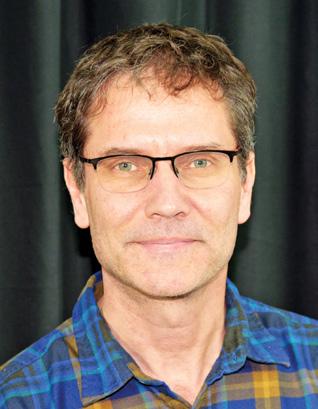
faith • Ruth Konrad
ALEX IS THE boy nobody wants in their class. He’s in grade two and has seemingly limitless energy and zero attention span. His comments and questions are never on topic, and everybody is convinced that he is learning nothing. He’s usually facing away from the teacher, making faces or jokes as they try to teach, and the end of the year is a relief because he is finally somebody else’s problem.
Alex isn’t a real person, but I’m sure if you have worked in children’s ministry for any length of time, you had a name (or two or three) pop into mind as you read that—I certainly had a few as I wrote it. We all know that our children’s program is exactly the place that child should be, but that doesn’t dismiss the feeling that the time and effort you poured in over that year—just trying to help them learn something—was wasted.

Fast forward four years for one of those names I had in mind, we’ll keep calling him Alex. He’s in grade seven, still a jokester, doesn’t seem to take life very seriously, and now he wants to help in our midweek children’s ministry through our leader-in-training program. For the next two years we carefully watch, we see him connect with kids and express his faith. In grade nine, he is eligible to lead a class of his own and we cautiously allow him to do so. And that may have been one of the best decisions we made.
He hasn’t settled down much. He’s still a jokester with far more energy than we know what to do with. And when we fill his class with boys just like him, he shines. He knows better than to make them all sit on their chairs to learn their verse, and the colouring sheets are usually ignored,
Show Them Jesus byJack Klumpenhower
“Jack Klumpenhower shares story after story about teaching the gospel to kids, and in a way that leaves you encouraged to shape how you teach and interact with the kids in your life and ministry.”
but the boys are learning. They’re doing jumping jacks and running circles, but at the end of the evening they’ve said their memory verses, and they know what the story was about. When they need to be calm and quiet, he knows just how to bribe (or, persuade) them to think it’s a good idea. And at the end of the year, those boys move on knowing they are loved and seen, and they have had a great year.
After serving in children’s ministry for almost 20 years, I have learned how to lead in a way that kids listen. I have also learned that they will almost always
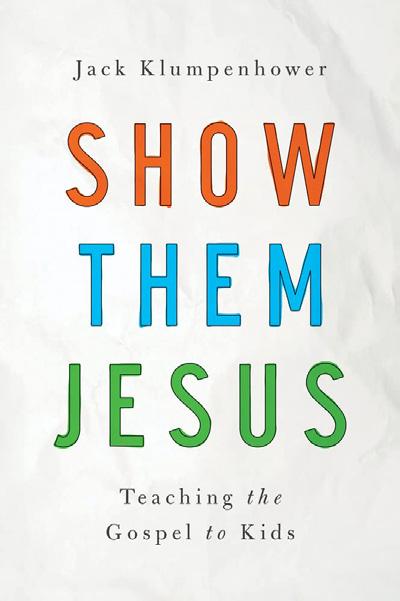
listen better to the 20-yearold young man sitting at the table with them, who often feels like he has no idea what he is doing. As long as there is a gap of a year or two, that young man has an inherent authority in kids’ minds that women have to earn.
The young man in your children’s ministry might do things differently but never discount the value of his presence. For many churches, the kids in your children’s ministry group may not have a godly male role model. Every time Alex goofed off with his boys, they learned that church didn’t always have to be quiet and “no fun.” When he followed the direction of the leader, they were encouraged to respect them too. And when he talked about faith, they listened.